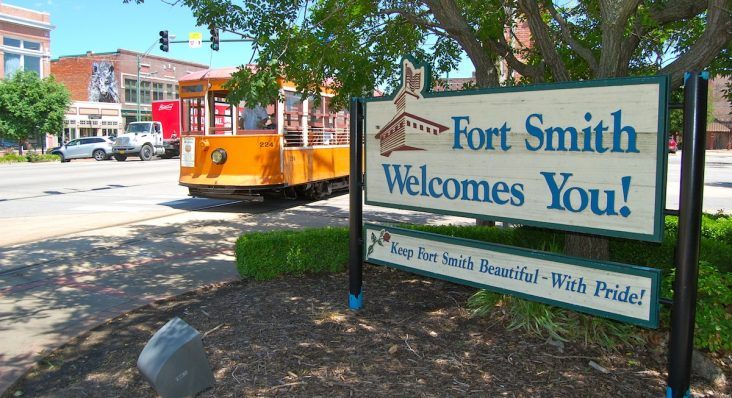CBID struggling to gain signatures for downtown Fort Smith assessment program
by September 21, 2021 5:09 pm 999 views

After three months of gathering signatures on a petition for property assessment for operation, maintenance and repair and improvements within the Fort Smith Central Business District, commissioners have received signatures from about 18.5% of property owners.
“We’ve been passing out petitions and having multiple discussions with people. Attitudes kind of run across the board as far as I can tell,” said Bill Hanna, CBID board chair, at the CBID commissioners meeting Tuesday (Sept. 21).
The CBID board has worked toward a property assessment – primarily in downtown Fort Smith – for almost two years. The board voted in August 2019 to pursue an assessment on downtown business. At the time Hanna said the Fort Smith CBID is one of the few in the state not funded by an assessment.
According to state law, there are two types of assessments that can be levied against real property inside a city’s improvement district – a project/improvement-specific assessment, levied to fund a “specific ‘plan of improvement,’” or a supplemental annual assessment to be used for ongoing operations or maintenance activities, Dingman said. Before an assessment can be levied, property owners who own more than 50% of the property value in the district must sign a petition agreeing to an assessment. There are 479 individual properties in the district, some of which are owned by the same entity.
Dingman said he has petitions signed by 18.5% of the property owners in terms of dollar value of property. He also said there are petitions that still need to go to several property owners. Dingman said getting signatures from the required number of property owners has been made more difficult because in the past few months some property has changed ownership.
“I’ve got multiple different discussions going on and trying to reach owners. Some are out of town. Some don’t live here,” Hanna said.
One of the largest property owners in the district is Baptist Health.
“Baptist Health is probably the biggest question mark. We have not really received official word on what their position is,” Hanna said. “I’ve talked to Kim Miller (president of Baptist Health Western Region) multiple times and our attorney … has talked to their legal staff. I’m hoping to hear back just any time. They have offered a donation, but that does not help us with the assessment.”
The petition sets the assessment as not exceeding 10 mils. In April, the CBID board voted for a cap of 10 mils on the possible property assessment and to cap any property owner at a maximum $10,000 on assessment. There are about four properties in the assessment area that cap will affect, Dingman said. Commissioners have stated they will decide each year what the coming year’s assessment will be if the assessment passes. The first year’s assessment, which if approved will be 2022, will be 8 mils. The CBID approved a resolution in November for a 6 mil assessment on property in the district. In April, commissioners voted to make the initial assessment 8 mil instead of 6 mil in order to reach the $300,000 they hoped to collect annually.
The CBID plans to use assessment funds to support an ambassador program that would hire off-duty police officers as part of a Safety and Security program for downtown. That program would cost about $136,000 annually, according to a proposed operating budget. The assessment would also fund a Green and Clean project that would include streetscape maintenance and landscaping, which could incorporate care of flowerbeds as well as pruning and possible replacement of trees, cleaning and repairs to benches, lighting and trash receptacles, litter control, conversion of lights along Garrison Avenue to LED and more. The CBID would need about $300,000 to fund both programs, Dingman said.
Based on property values in 2019, each 1-mil assessment on properties within the CBID would amount to $38,834.47 in annual operating revenue. However, that estimate did not take into account any property owned by not for profit agencies or local, state or federal government. Of the land parcels in the CBID, 115 are tax-exempt and have no value assigned to them. These include properties owned by governments, non-profits, churches, etc., according to information provided by the CBID.
In 2019, the CBID hired Total Assessment Solutions (TAS), Sebastian County’s contracted third-party appraisal partner, to assess those properties. Looking at the total appraised property, each 1-mil assessment on all properties within the CBID would amount to approximately $61,000. However, some of those properties would be exempt from the assessment. While some government properties would continue to be exempt from the assessment, not for profit entities would not be, said Michelle Allgood, the attorney working with the CBID on the assessment question.
Hanna said the commissioners had agreed that city properties would not be assessed, but county and state properties would be. Once the signatures are gathered, the CBID board of directors will present that petition and the plan to the Fort Smith City Board of Directors. Dingman said under the state law if the CBID has the required signatures on the petition, the city’s BOD would be compelled to approve the assessment as an ordinance.
CBID commissioners plan to have a strategic planning session in November to plan how monies from the assessment would be allocated and what the new plan will be if the assessment does not happen, Dingman said.
